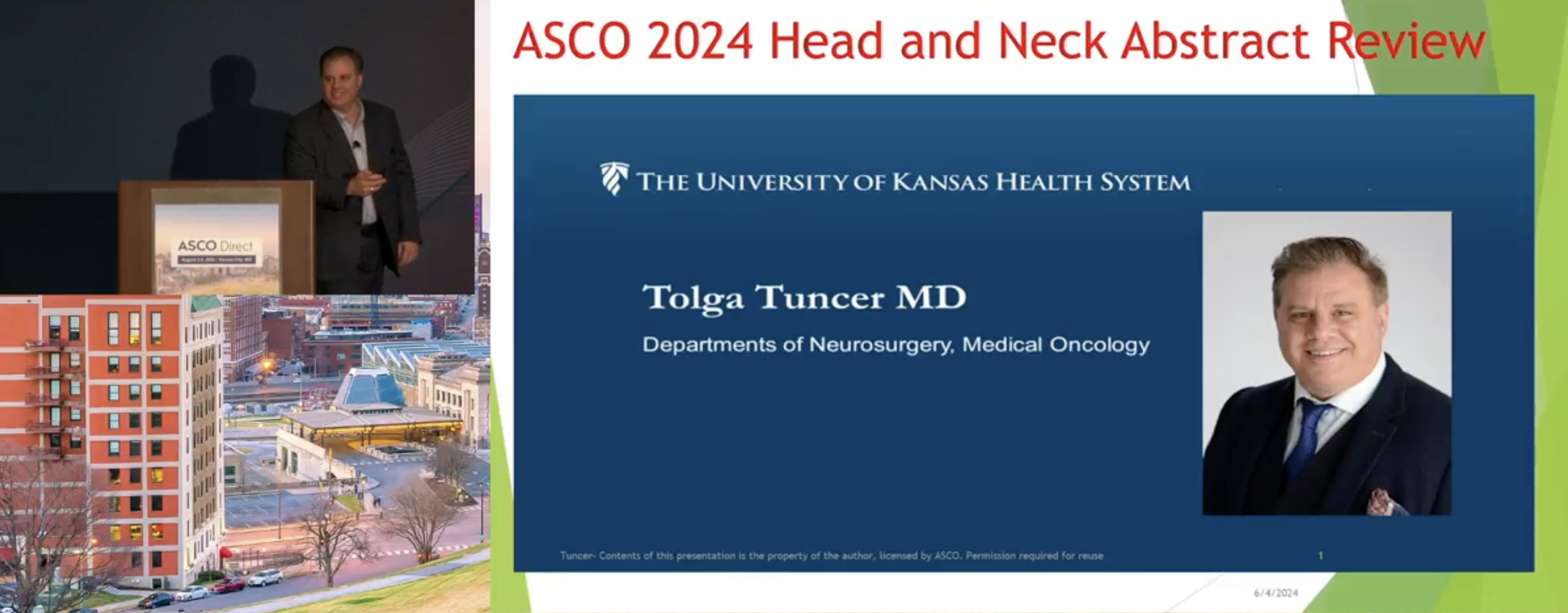ASCO Kansas City: Dr Tuncer Discusses Proton Versus Photon Radiotherapy for Oropharyngeal Cancers
Presenter:
Tolga Tuncer, MD, University of Kansas Health System
Conference:
ASCO Direct™ Kansas City
The Bottom Line:
Intensity-modulated proton radiotherapy (IMPT) offers a benefit over traditional photon-based radiotherapy (IMRT) for patients with head and neck cancers of the oropharynx (oropharyngeal cancers) by reducing unnecessary exposure of unaffected normal tissues and important associated adverse events such as mucositis, malnutrition, and feeding tube dependence. Results from a recently reported phase III randomized trial now support the use of IMPT over IMRT for the management of head and neck cancers.
Background:
Recent findings have suggested that advanced radiotherapy technologies, such as intensity modulated proton therapy (IMPT) offers a significant advantage over conventional, intensity modulated photon-based radiotherapy (IMRT) by reducing exposure of normal unaffected tissues in the head and neck. This can lead to a substantive reduction in significant adverse events such as dry mouth, mucositis (inflammation) and edema (swelling) of the tongue and oral tissues, all of which can lead to difficulty eating and swallowing, malnutrition, weight loss, and dependence on feeding tubes for patients receiving radiotherapy for head and neck cancers. Earlier trials had established IMPT as being “non-inferior” or equivalent in its anti-cancer efficacy, to IMRT for patients with head and neck squamous cell cancers (HN SCC) of the oropharynx. Results from a phase III randomized trial of these two therapies, reported at this year’s annual meeting of the American Society for Clinical Oncology (ASCO) by investigators at the MD Andersen Cancer Center, compared outcomes in patients with HN SCC cancers of the oropharynx.
Key Findings:
Patients in this trial had stage III and IV oropharyngeal cancers with SCC histology and received 33 days of treatment with either IMPT or IMRT, followed by 10 weeks’ recovery, with chemotherapy for locally advanced disease. Their disease was then re-staged and, based on findings, assigned to either surgery or no surgery, with follow up and assessment of patient-reported outcomes (PROs). About 50% of patients in each arm of the trial were never smokers, 95% were positive for Human papilloma virus (HPV), and most (85%) had not received any induction chemotherapy.
The results confirmed that IMPT was non-inferior (essentially no different) to IMRT for the endpoint of progression-free survival (PFS), with an improvement of about 13% for IMPT over IMRT. The endpoint of overall survival at 3 years was also better with IMPT over IMRT, with an improvement of about 37%. Importantly, the percentage of patients with malnutrition was lower (75%) for the IMPT group versus the IMRT group (86%), and more patients were able to sustain their body weight with IMPT (25%) versus IMRT (14%), and these differences were statistically significant (P=0.037), suggesting that IMPT led to important clinically relevant benefits in terms of reducing adverse events over IMRT. In addition, the percentage of patients requiring a feeding (gastronomy) tube was reduced form 42% with IMRT to 28% with IMPT.
Conclusions and Faculty Insights:
The author’s concluded that the trial provides randomized, phase III “Level 1” evidence for the benefit of IMPT over IMRT when used for oropharyngeal cancers. Dr Tuncer agreed with the authors’ conclusions from the study, and suggested that based on evidence from this randomized trial, IMPT could become a new standard of care for locally advanced head and neck cancers, including oropharyngeal cancer.
Speaker Disclosure Information:
Dr Tuncer reported the following disclosures for this presentation: Employer: The University of Kansas Health System; Consultant or Scientific Advisory Board: NovoCure; General: No vested interests, but off-label and/or investigational use of pharmaceuticals or devices discussed.

